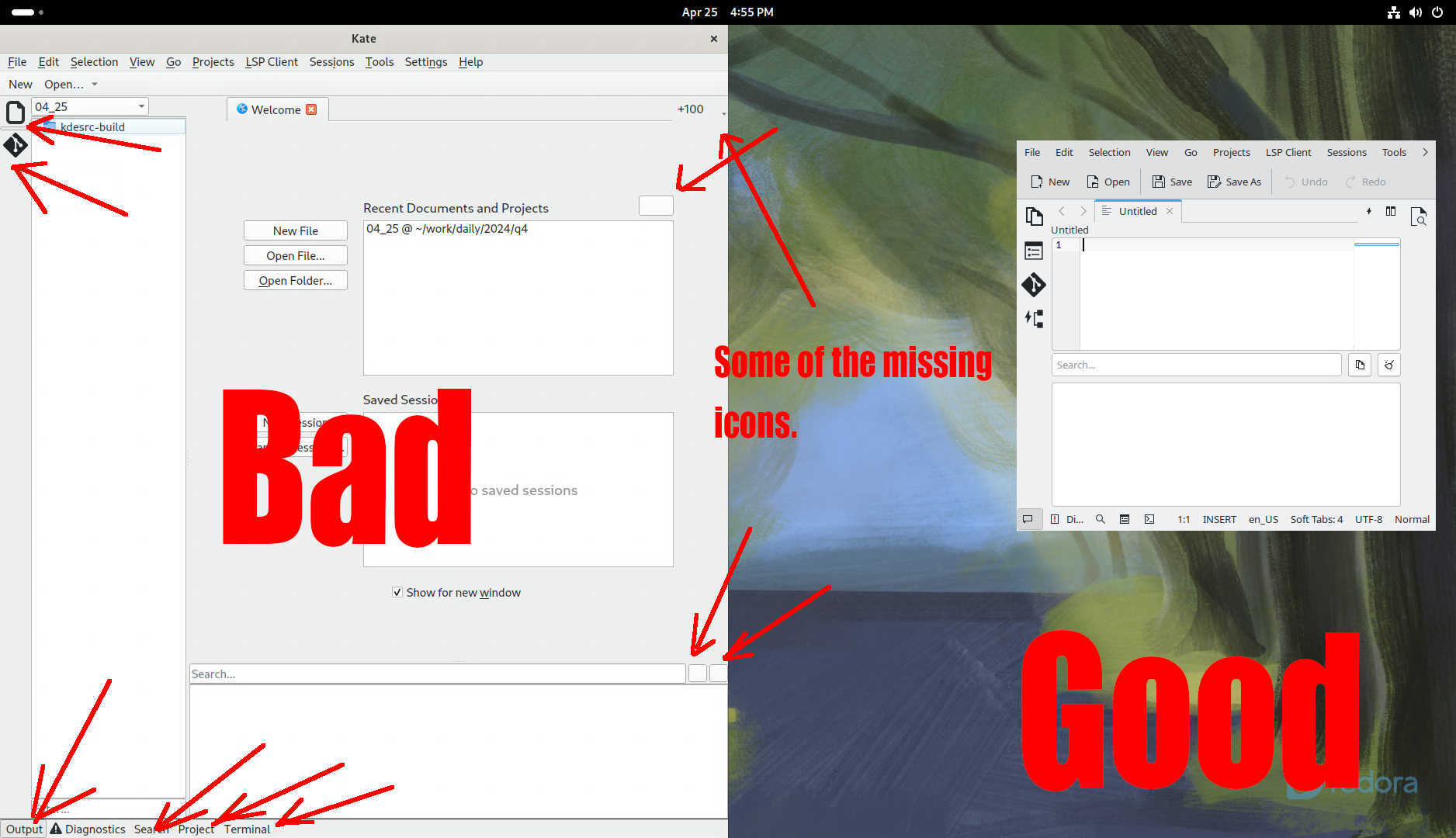XFCE users looking around worriedly – can you please not mess with GTK? … please?
…
…
so … um, I’ve been hearing nice things about LXQT lately?
This is Libadwaita not GTK3
*sigh*
It’s GTK4, libadwaita is just their really weird theming stuff, but the UI toolkit is still called GTK, and version 4 of it forces you to use libadwaita. You can’t change the theme, because Gnome is actually user-hostile.
You can use a different theme with GTK 4 (not that you would want to)
Gnome breaking shit for no reason as always =P
Seriously, this is as simple as keeping symbolic links for compatibility, but they won’t do it because it maybe might possibly lead to issues.
You summarised it nicely why gnome people frustrate me
I can’t believe they’ve been doing this since the very start of the Gnome project. I stopped using it long, long ago (1.1) when they dropped their nice and configurable WM for something you couldn’t do anything with. Nice to see they haven’t changed a bit.
deleted by creator
deleted by creator
That’s because Cosmic is made by really cool people at System76 who actually care about their users/customers and the broader open source Linux desktop ecosystem
Is being a massive cunt a requirement if you want to be a GNOME developer?
Yep.
It’s in the SOW.
I can’t wait to throw it on my laptop. I hope the tiling is highly customizable because I need something I can throw on a laptop, not update in a while and still have it not break when I finally do.
I like Hyperland but it does break the config every once and a while.
Familiarity breeds contempt, give it some time and I’m sure cosmic will have its share of haters too. There’s hundreds of gnome devs, and all you’re seeing are clickbait blogposts like these made to stir up the pot. Go check out the discussions on discourse, matrix, or even gitlab to see what they’re actually like.
I’ve interacted directly with gnome devs and they live with their heads in the sand.
But they’re so nice, friendly and engaging! (lol)
I’ve interacted directly with gnome devs and they were entirely reasonable and respectful.
What does that even mean?
deleted by creator
The problem isn’t that every gnome dev is bad - not by a long shot. The problem is that there are just enough gnome devs in just the right (wrong?) positions who have an “our way or the highway” philosophy that it causes problems not just for people trying to use GNOME, but for people (such as the Kate developers) who are trying to give their users a good experience.
And by being the default in so many distros, GNOME has enough clout that if they choose to abandon a standard, many people will change to whatever GNOME does, making their applications worse for people on other desktops.
In the end it’s not too dissimilar to the problems created by the dominance of Chromium and Windows. The biggest difference IMO is that Google are actually more conciliatory towards others than the GNOME team are in many cases. Which is kinda crazy given how much Google can throw their weight around on the web.
Reading the bug report about all that ( https://gitlab.gnome.org/GNOME/adwaita-icon-theme/-/issues/288 ), it’s crazy to see how the gnome dev (Red Hat employee) replies to the issue. He completely ignores the issue in the beginning, then that he doesn’t care to follow the spec because it’s “old”, and yet, he still advertises to the OS as an fdo theme, so OSes ship with it. He’s hurting non-gnome apps, and he simply doesn’t seem to care about it. To me, this shows a person who simply doesn’t care about ecosystem.
Gnome is the Mac of the Linux desktop world.
Nothing new here, Gnone losted the plot with Gnome 3.
I have defended Red Hat a fair bit over the past year. Their level of contribution to the community is a big reason why.
It is clear though that their prominence comes with a downside in the paternal and authoritative way that their employees present themselves. Design choices and priorities are made with an emphasis on what works for and what is required for Red Hat and the software they are going to ship. The impact on the wider community is not always considered and too often actively dismissed.
Even some of the Linux centrism perceived in Open Source may really be more about Red Hat. For example, GNOME insists on Systemd. Both projects are dominated by Red Hat. There have been problems with their stewardship of other projects.
To me, this is a much bigger problem than all the license hand-waving we saw before.
Gnome uses systemd because it is easier and better. Why would you reinvent the wheel.
If you look at every interaction with a Redhat developer in the context of them having KPIs / set work to do. The responses to non critical issues / MRs makes a lot more sense.
Not saying that it makes it any better tho.
If it’s sabotage, it would be kind of caring.
I was getting really pissed seeing that Pointieststick had to explain the same fucking thing OVER AND OVER again. I don’t know if the gnome dev in question is stupid or just trolling.
removed by mod
You could just not use it
removed by mod
But they need to use MY DE!!! /s
Yes
Gnome devs to Gnome users: get gnomed you gnomes
I got gnomed
deleted by creator
Breaking changes is what drove me to switch to KDE.
If Linux is to go mainstream I feel like KDE needs to be the default Desktop experience on distros. The Windows-like style is what the majority of people recognize and are familiar with and the KDE developers seems to care a lot about their userbase.
New users already has a lot to deal with and learn when it comes it Linux. They don’t need their desktop environment to work against them too.
There’s a proposal to make KDE the default in Fedora, I really hope this gets accepted.
If not, Fedora isn’t that great anyway. Universal Blue-based distros like Bazzite or Aurora are much better nowadays.
I disagree with this, personally. There’s a lot more to initial usability/discoverability, than Windows-compatible visuals. If anything, when i’ve switched a couple of my family members off Windows, they asked me for something that doesn’t look like it, because they could never navigate through the desktop properly
More closed and non-customizable systems are much more stable. I guess that’s what GNOME devs are trying to achieve and I don’t really mind it. We have other options for those who need customization. The most used and mainstream one really should be focused on stability. Though I don’t think anyone tried breaking icons before. It’s a bit too much. The app devs will need to make multiple icons for different DEs which is a good thing but shouldn’t be forced like that
Ahh, the old “it’s too difficult for us.”
If the gnome devs are so incompetent, why don’t they just get another job?
Don’t advertise the theme as standards compliant then.
I would argue that gnome is pretty stable in recent years. Don’t remember when was the last time something crashed.
This might would probably be true for Extensions.
KDE has been unstable for me on Wayland in the past.
I’ve had growing pains for KDE on Wayland in the past but it’s been chill in recent times too, I can’t remember having any issue related to that for a long time
You’re talking about two different kinds of stability. They are talking about development stability. You are talking about runtime stability.
One thing is to not break applications that use your library because of changes you introduce to it. Specifically changes that go against the standard you’re supposed to be following.
Another thing altogether is to not go outside the memory limits of the application so it doesn’t get yeeted by the kernel.
The standards are supposed to be the stable thing. If some part of GNOME advertises itself as following a specific standard then it should remain stable in following that standard.
That is a misconception that 99% of the devs don’t understand. Sometimes you do need major changes that break stuff to upgrade the base. GNOME started doing it recently. Keeping old bases for a very long time makes them bloated, hacky, slow and unstable
In that case, you implement the old API or other interfaces so older things will continue working, while having the new one alongside it, and then phase the old one out when nobody is using it anymore. It’s not that hard to emulate an older API with a newer subsystem. Just a shitload of function wrappers and things so that the things your program used to call now transparently use the new system while the program is unaware anything changed from its perspective.
That’s what happens with the Linux kernel. Linus would go apeshit if one of the devs straight up broke a ton of user programs with a change. He’s already demonstrated his commitment to not doing that in one of his mailing list rants. Because unlike GNOME, the kernel is running some pretty critical things all around the world.
GNOME seems to be treating their DE like their own little pet project that they’re tinkering with alone in the basement without caring that millions are relying on it every day. Breaking a large portion of programs on a regular basis is what I do in the evenings. Not professionals.
I won’t even try to explain. People here only want to argue
No, you’re just dense.
I imagine most readers will assume that response indicates that you have no argument.
That is totally fine. I doubt anybody wants to fight. I am glad we were able establish the value you had to add.
If you don’t want to argue (which I highly appreciate) it doesn’t mean others don’t too. This place is quite toxic
deleted by creator
Linus Torvalds is author and maintainer of one of the most successful pieces of software ever written ( software that is decades old and still growing in popularity ).
What does Linus says about your philosophy that “Sometimes you do need major changes that break stuff to upgrade the base”? I think his first sentence explains where he stands but he expands on his initial point.
Something Stomething. NEVER BREAK USER SPACE!
Implementing old standards does not magically result in unstable software. I can create software today that implements decades old standards using whatever whiz-bang tech is in vogue.
I do lot accept that “old bases” have to succumb to any of the things you suggest either. Refactoring is a thing. You can remove dead code, you can adopt new patterns, you make code modular, you can even extend using new tech if you want.
Linux is 30 years old ( the basic design is decades older ). Should we throw it out? I vote no but allowing Rust into the kernel seems like a good idea. How old is GCC? How old is Microsoft Office? How old is Firefox? This is software you may use every day. Trust me, your life relies on software that is much, much older. How often do you think they rewrite air traffic control systems or core financial software to to make it more “stable” as you suggest?
I mostly hear your argument when devs want to try new tech and cannot justify it any other way. Most often the result is something that is far buggier and missing many features. By the time the features return, the new code is at least as bloated as the original. Around then, somebody usually suggests a total rewrite.
Old architectures are a different story. Sometimes things are not worth fixing in place. In my experience though, this is fairly rare. Even then, in-place migration to something else often makes more sense.
In my view, if you cannot modernize an old code base, it is a skills issue.
I guess that’s what GNOME devs are trying to achieve
They should strive for something like FLTK then, it has much smaller codebase.
Gnome to Gnome users: Why are they constantly shooting themselves in the foot?
Gnome to a Xfce (me) or KDE user: hey y’all come quick they’re doing something stupid again
deleted by creator
Again? Aren’t Mate and Cinnamon enough Gnome forks already?
We fork until there’s nothing else!
Wait, I remember Mate being a Gnome2 fork but Cinnamon? The more you know… :o
You could argue that Cinnamon is not really a “fork” per se. It is more of an alternative interpretation.
MATE is a true fork. When GNOME abandoned GNOME 2 for GNOME3 3, MATE picked up the GNOME 2 code and continued.
Cinnamon took GNOME 3 and built a different desktop experience on top of it. Specifically, they rejected the controversial GNOME Shell to present a more traditional desktop. The earliest attempts at Cinnamon tried to provide a traditional desktop in GNOME Shell itself. By the time Cinnamon 2 came out, GNOME Shell was completely gone.
Cinnamon also provides X-apps which is a suite of GNOME applications adapted to work with Cinnamon ( but also MATE and XFCE ). These really are forks.
Thanks for the detailed reply! Now that I think about it I do vaguely remember a desktop with GNOME shell featured and a bar at the bottom.
Man, the early days of GNOME 3 were awkward. I remember desperately trying stuff out now that GNOME 2 was phased out and ending up making my own de over openbox in the end. What a frustrating era.
we nominally now have yet another fork – Cosmic – born out of the frustration of having to do everything through Gnome extensions that would break with each new Gnome release … (well, that and @soller wanting to work in Rust)
Good grief :V
Cinnamon was forked off a very early Gnome 3.x version. It diverged a lot since then.
Aha! Gotcha, that does bring back dome distant memories.
Gnome devs being gnome devs.
I really love GNOME but the developers keep doing shit like this and I don’t get why. Their reasoning for why they won’t allow custom accent colors and only predefined ones was also stupid and then they just said that if people keep asking for custom colors, they won’t implement it at all.
deleted by creator
That’s wild, flat out telling the community they’re going to refuse to implement something if they want it enough to ask for it
I won’t presume how easy or hard implementing that would be, but I have a hard time believing it would be so significant that this stance makes any sense at all
The Macos of the Linux ecosystem.
deleted by creator
Okay? Did I say anything about that being owed? They’re also not owed a community using their community project, so acting like that just makes no sense and seems counter to a goal of building or maintaining an active community of users
I didn’t say they aren’t allowed to do that so maybe go have that argument with someone who did.
The reasoning for only allowing predefined colors was that, apparently, developers need to be able to test against every color and that Android’s Material You is a total mess. I disagree with both of that, Material You seems to be working quite fine (I’ve also made apps myself) and I don’t get what developers would need to test with accent colors. I couldn’t voice my opinion tho cause then the whole thing would’ve been canned.
Android’s Material You is absolutely disgusting though with it’s bizarre theming choices and piss-like pastels and fucked notification shade and the dark mode circle jerk and it frankly seems to be an attempt to assassinate material design and everything that made it a defining tech aesthetic of the late 2010s
I never really gave gnome a chance until I came across bluefin recently. I was pleasantly surprised but the lack of customizability always drives me away in the long run. Im not against opinionated design, their opinion on how things should be just seems to differ from my own.
























